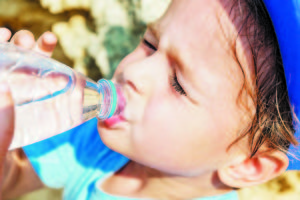 By Diana Nelson
By Diana Nelson
The summer swelter has arrived, and with it some sound advice to make sure you have plenty of your favorite icy beverages on hand along with an assortment of shady spots to retreat to.
And, of course, a refresher of the things you have learned in years past but may have forgotten.
Whether you’re an Arizona native or new to the state, a few standard recommendations, coupled with a review of ways to avoid heat-related illness, are always in season, says emergency department physician Dr. Sandra Indermuhle of Dignity Health Chandler Regional Medical Center.
Indermuhle, a board-certified emergency medicine physician at the west Chandler-based Dignity facility, offers specific advice on ways to avoid the health conditions that extreme heat can cause.
- If you exercise outside or perform yard work be sure to do it as early as possible. Avoid being outdoors between 11 a.m. and 6 p.m.
- Staying hydrated is the Valley’s mantra—and, because we live in an arid climate, it’s required all year long. The usual guideline of 64 ounces of fluid a day is a minimum and should be increased during summer. So be sure to drink water or other clear fluids that replenish electrolytes. Also, limit soda, caffeine and alcohol during any outside activity.
- Protect your skin by wearing sunscreen so that you don’t allow yourself to get sunburned. Reapply after any extended time outdoors. Also, wear a hat, loose clothing and sunglasses whenever possible.
Be sure to never leave children or pets unattended in vehicles.
“Despite the usual warnings by the media to be mindful of the heat, there are plenty of people who don’t always follow the recommended guidelines,” said Indermuhle. “Those are the people we usually see in the emergency room.”
In her experience, says Indermuhle, more elderly people with underlying medical conditions, typically those who take beta blockers or diuretics for heart or blood pressure, are at higher risk.
And, she says, even some anti-depressants and antihistamines can contribute to having more trouble with the heat.
“Children also are more susceptible to heat related reactions because they generally lose more fluids without replacing them,” noted Indermuhle.
For those who don’t follow commonly held medical advice or do so and still experience heat related symptoms, Indermuhle says an emergency room trip may be advisable.
The three categories of heat-related illnesses include heat cramps, heat exhaustion and heat stroke.
Cramps usually occur due to dehydration from sweating. When symptoms escalate to heat exhaustion, they also include nausea, general weakness, dizziness and more severe body cramps from a loss of water and salt in the body.
Heat exhaustion means that the body is unable to cool itself properly and, if left untreated, can progress to heat stroke.
“Cooling off, preferably indoors and by re-hydrating your body, may relieve this condition,” said Indermuhle—”especially so the symptoms don’t advance to heat stroke, which is serious and is diagnosed as when the body temperature exceeds 105 degrees.”
“If we see a patient who has progressed to heat stroke, it’s a critical condition because it can advance to damage the brain or internal organs,” said Indermuhle.
The Emergency Department at Chandler Regional Medical Center is open seven days a week, 24 hours a day.
For more information about waiting time or to schedule an appointment, visit the hospital on line at www.dignityhealth.org.

